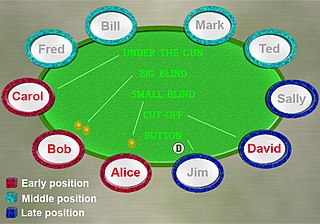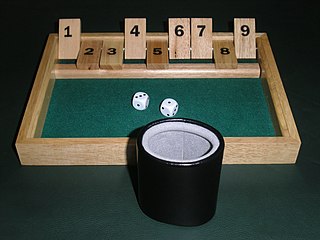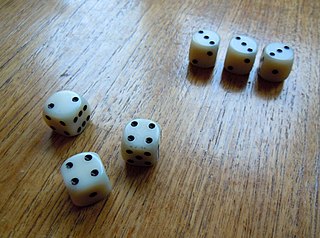
Craps is a dice game in which players bet on the outcomes of the roll of a pair of dice. Players can wager money against each other or against a bank. Because it requires little equipment, "street craps" can be played in informal settings. While shooting craps, players may use slang terminology to place bets and actions.

In the game of poker, the play largely centers on the act of betting, and as such, a protocol has been developed to speed up play, lessen confusion, and increase security while playing. Different games are played using different types of bets, and small variations in etiquette exist between cardrooms, but for the most part the following rules and protocol are observed by the majority of poker players.

Yahtzee is a dice game made by Milton Bradley. It was first marketed under the name of Yahtzee by game entrepreneur Edwin S. Lowe in 1956. The game is a development of earlier dice games such as Poker Dice, Yacht and Generala. It is also similar to Yatzy, which is popular in Scandinavia.

Brag is an 18th century British card game, and the British national representative of the vying or "bluffing" family of gambling games. It is a descendant of the Elizabethan game of Primero and one of the several ancestors to poker, the modern version just varying in betting style and hand rankings. It has been described as the "longest-standing British representative of the Poker family."

Shut the box is a game of dice for one or more players, commonly played in a group of two to four for stakes. Traditionally, a counting box is used with tiles numbered 1 to 9 where each can be covered with a hinged or sliding mechanism, though the game can be played with only a pair of dice, pen, and paper. Variations exist where the box has 10 or 12 tiles.

Three man is a drinking game played with two dice. It can be played with at least three people but some consider it better with around five.

Pig is a simple dice game first described in print by John Scarne in 1945. Players take turns to roll a single die as many times as they wish, adding all roll results to a running total, but losing their gained score for the turn if they roll a .

Cee-lo is a gambling game played with three six-sided dice. There is not one standard set of rules, but there are some constants that hold true to all sets of rules. The name comes from the Chinese Sì-Wŭ-Liù (四五六), meaning "four-five-six". In America it is also called "See-Low," "Four-Five-Six," "The Three Dice Game," "Roll-off!," and by several alternative spellings, as well as simply "Dice." In China it is also called "Sān Liù Bàozi" (三六豹子), or "Three-Six Leopards". In Japan, it is known as "Chinchiro" (チンチロ) or "Chinchirorin" (チンチロリン).

Dudo, also known as Cacho, Pico, Perudo, Liar's Dice, Peruvian Liar Dice, Cachito, or Dadinho is a popular dice game played in South America. It is a more specific version of a family of games collectively called Liar's Dice, which has many forms and variants. This game can be played by two or more players and consists of guessing how many dice, placed under cups, there are on the table showing a certain number. The player who loses a round loses one of their dice. The last player to still have dice is the winner.
Farkle, or Farkel, is a dice game similar to or synonymous with 1000/5000/10000, Cosmic Wimpout, Greed, Hot Dice, Squelch, Zilch, or Zonk. Its origins as a folk game are unknown, but the game dates back to at least the mid-1980s. It has been marketed commercially since 1996 under the brand name Pocket Farkel by Legendary Games Inc. While the basic rules are well-established, there is a wide range of variation in both scoring and play.

Dice 10,000 also Greed, Dix Mille, Reload, 5-Dice is the name of a family dice game played with 6 dice; it is similar or identical to the commercialized Farkle. It also goes by other names, including Cargoose, Zilch, Zilchers, Foo, Boxcar, Bogus, Lewis' Dice, Crap Out.
Mexico is an elimination-style dice game, in which several players agree to play a set number of rounds. After each round, one player is eliminated. When all players but one have been eliminated, the remaining player wins the game. Owing to its extremely simple play-structure, it is generally pursued as a method of gambling, whereby the final remaining player wins the amount of money wagered by each person who was eliminated in earlier rounds. A variant of the drinking game liar's dice known as Mexican or Mia uses similar dice rolls, but has very different game mechanics.
Chingona is a dice game played by two or more players, using four or five dice and a cup. It is usually played to decide who is to pay for the next round of drinks, but betting can also be involved.

Victory at Sea, subtitled "World War II Naval Combat Game", is a set of World War II naval wargaming rules published by Mongoose Publishing in 2006.

Balut is a game of dice, similar to Yahtzee, created by United States soldiers as an alternative to poker, and is a popular pastime of businessmen overseas.
Stud poker is any of a number of poker variants in which each player receives a mix of face-down and face-up cards dealt in multiple betting rounds. Stud games are also typically non-positional games, meaning that the player who bets first on each round may change from round to round. The cards dealt face down to each individual player are called hole cards, which gave rise to the common English expression ace in the hole for any hidden advantage.

The Mutschel is a traditional star-shaped bread from Reutlingen, Germany. The pastry, and the corresponding Mutscheltag, have probably existed since the 13th century. Mutscheln are roughly star-shaped and come in various sizes: usually approximately six inches in diameter, but bakeries often offer breads three or more feet in diameter. The most common Mutschel is made of wheat, yeast, a small amount of fat like lard or butter and eggs. They are sometimes made in sweet varieties.

Zombie Dice is a "press your luck" party dice game created by Steve Jackson Games and released in 2010. A digital app version of the game has also been released.

Bar dice is a drinking game played with five dice and a cup. Generally played in a bar, tavern or pub, the game is often used to determine which of the participants will pay for the next round of drinks.

Midnight is a dice game played with six dice.

















